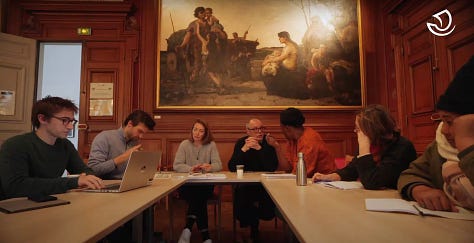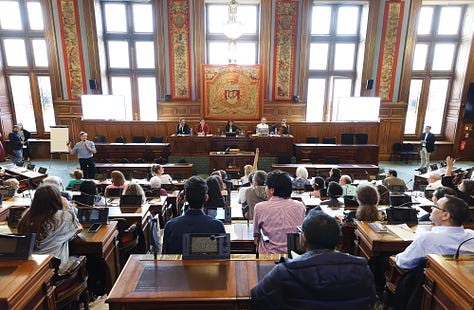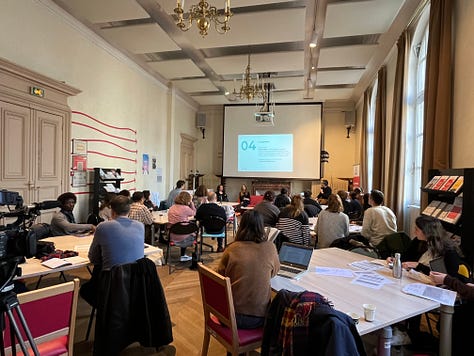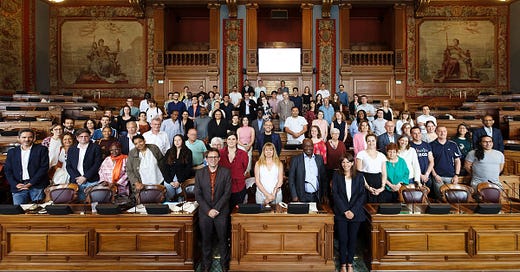How a permanent Citizens' Assembly in Paris passed a bill into law
A French civil servant who facilitated the historic process explains what happened, from start to finish
On July 10, for the first time in history, the Paris City Council took up major legislation written by a permanent Citizens’ Assembly, composed of 100 regular people, and passed it directly into law.
To understand how this happened, we spoke (in French) to Elian Belon, the General Secretary of the Paris Citizens’ Assembly.
“For this to be a success, you need a strong political will,” Belon told us. “The executive was really involved. The mayor was very supportive and has followed really closely. The politicians were very impressed by the capacity of the citizens.”
In an interview, Belon described the process from start to finish. The Paris Citizens’ Assembly was established in 2021, designed by a group including DemocracyNext Founder/CEO Claudia Chwalisz and Federation for Innovation in Democracy (FIDE).
The assembly worked from September 2023 to April 2024 in two working groups. One group would work to develop a Citizen Bill on one of three issues suggested by the mayor and executive (either policing, homelessness, or advertising in public spaces), while the other group would develop policy recommendations on an issue decided from the bottom-up.
The assembly deliberated and voted to work on the issue of homelessness and on greening the city. Assembly members were free to choose which working group they wanted to be part of, knowing there was going to be more time involved in developing the Citizen Bill.
Belon began in the same place as the citizens: knowing relatively little about the issue of homelessness. Now, he knows it inside and out. “In Paris, there are around 50,000 people who are without a fixed home address and may be living in shelters,” he explained. “We also have something called La nuit de la solidarité — the night of solidarity — which is a census of homeless people living on the streets. The most recent one counted 3,600 people.”
The assembly determined there are around 120,000 vacant homes in Paris at any moment, with 18,000 that are always vacant. The assembly members came to understand the division of policies and roles on this complex issue between the city and state government.
“‘Emergency housing’ is a competence of the state, not the city,” Belon said. “This was reflected in the citizens’ recommendations. There are parts directed at the city, and others that are directed at the state. The city will take on the ones directed at it—and will lobby with the state for the others.”



The 40 citizens in the homelessness working group met over the course of one year, in 4 phases:
An introduction to define the scope and problem, and the creation of working groups among the assembly members.
An exploratory phase, entailing 3-4 months of exploration of the issue to understand it and learn as much as possible. This included expert witnesses, documentation, as well as deliberation time to capitalise on the new information being presented. The assembly members created an intermediate synthesis to capture where they were in their reflections, the first elements of their response, and their diagnosis of the problems. They also exchanged with the city administration, the elected officials, the mayor, and the vice mayor. They re-adjusted the mandate and shared their reflections, including that they wanted to do more on-site visits.
Witness sessions in which the citizens called for individuals to come and share their expertise and perspectives. Then, after further deliberation, they reached their collective view on the issue, which included 43 recommendations.
Writing of the Citizen Bill—the legislation itself. In this phase, co-writing of the bill took place with the city administration. How do you pass from a set of citizen recommendations to a Citizen Bill, which can be brought by the Executive to the City Council directly for a vote?
The result was a final Citizen Bill on Homelessness with two axes, according to Belon. The first focuses on interventions in key moments for people who may be becoming homeless; the second contains preventative measures, including creating the conditions for successful social work. These include:
Extending social aid for children until age 25. When French people are on the streets, many of them have come from the social aid system. This is the domain of the city. The assembly members recommended that young people should be accompanied until they are 25 years old rather than 18. They also recommended conducting research about these young people to better understand what happens and what the administration is missing by letting these young people go by.
Increase the number of emergency housing places by 3,000. This was a key recommendation for the state, but the city took this seriously and it was important for it to be in this bill.
Creation of a welcoming place for new arrivals to France. There used to be such a place, called “La bulle”, maintained by non-profits and public authorities, but it was closed down a few years ago. The assembly members couldn’t understand why. The assembly felt there is a need for a place of welcome for people who arrive on the territory.
A set of recommendations on improving the working conditions for social workers. Social work is undervalued — there are lots of vacant posts and degraded working conditions, Belon said. Recommendations focused on improving the working conditions and how to keep people in that line of work. These positions are indispensable for addressing the issue of homelessness.
A suite of recommendations supporting the development of more social housing.
In total, there are 20 measures in the Citizen Bill that were adopted. The entire process comprised 4 plenary sessions, 16 half-day workshop sessions, 7 site visits, plus 3 co-creation sessions to finalise the bill. Over 30 witnesses presented evidence. Assembly members were remunerated 50 euros per half day of work.
This marks the first time a political body—the government of Paris, a city of 11 million—has taken up and passed legislation written by citizens from all walks of life who were selected by sortition and who deliberated in an assembly.
The process culminated in what Belon described as the “co-creation, down to the comma, of the Citizen Bill to go from the 43 recommendations to the 20 recommendations that are in the bill… Measure by measure, they went through them: What’s possible and in what timeframe?”
These concrete questions generated some long and occasionally tense discussions about what would be included, what could be merged, and what could be discarded. But, Belon said, “they enabled us to get to a point of validation of the full working group of its recommendations.”
The homelessness working group brought the Citizen Bill back to the full assembly of 100 for discussion, amendments, and ultimately approval by vote.
“There was unanimity amongst all of the Citizens’ Assembly members before it went to the Paris City Council and was adopted,” Belon explained. Two assembly members themselves presented the bill to the council and relevant commissions.
Crucially, “We also had exchanges with all the political parties,” he said. “The opposition parties were invited all along the process and to each plenary. This enabled them to have a dialogue in advance with all parties and to exchange with them before the city council vote.”
We are often taught that in traditional democracies there are co-equal branches of government (legislative, judicial, etc.) which work in concert with and sometimes act as a check on other branches.
In Paris, according to Belon, the other branches of city government were “always impressed by the finesse of the recommendations…. It’s important for the administration to be able to observe from the corner of their eyes the work being done by citizens, because they question, ‘Can citizens really do better than them on a subject that they have worked on for many years?’”
Read the legislation itself here, and for more, watch this video.
What’s on our radar
🇹🇼 Don’t miss our Advisory Council members Audrey Tang and Jon Alexander in conversation at The Conduit! Watch above.
Jon called his time with Audrey during their visit to Britain “three of the most incredibly inspiring days of my life.” (For more on Taiwan’s successes, see our Communications Director Ansel Herz’s take on their last election.)
💸 A group of pension members have, for the first time, entered into deliberation as part of a Citizens’ Jury to produce recommendations on responsible investment. More info in this Deelnemersdialoog Report.
🇱🇺 In Tageblatt, writer Philip Mecel lauds our Cities Programme which includes a new assembly in the works in Esch, Luxembourg. “In 2025,” he writes, “a citizens' council is to be set up that will have a say in the city's future issues.” Indeed!
🍂 Upcoming events and collaborations this autumn
Most of the DemocracyNext team will be on break in August, so there won’t be any newsletters next month, but nevertheless there’s plenty of action coming up this autumn:
August:
1st: Deschutes County Civic Assembly on Youth Homelessness public Lottery event
16th: Embedding Citizens’ Assemblies Workshop, co-convened in Dublin with Professor David Farrell of University College Dublin, bringing together contributors to our forthcoming edited volume
September:
14-15th: First weekend of the Deschutes County Civic Assembly
18th: Claudia Chwalisz will speak at the UN Science Plenary in NYC
24th: Claudia Chwalisz will speak at a public event at the MIT Museum with Audrey Tang (former Taiwanese Digital Minister), Deb Roy (Director of the MIT Center for Constructive Communication), and Michael John Gorman (Director of MIT Museum) about democracy and AI
We’ll announce our International Cities Cohort who we’ll be working with for the next 18 months
We’ll also publish a synthesis paper following our More-than-Human Governance convening this past June, and co-publish with IWM a new paper by DemNext Senior Advisor Ieva Cesnulaityte on deliberation as an antidote to authoritarianism
October:
4-6th: Second weekend of the Deschutes County Civic Assembly
5th: The Birmingham Museums Citizens’ Jury will kick off
November:
4-8th: Our Cities Programme lead James MacDonald-Nelson will speak at the World Urban Forum in Cairo
18th: Second weekend of deliberations of the Birmingham Museums Citizens’ Jury
23-24th: In-person weekend of the Tech-enhanced Citizens’ Jury on AI in healthcare. We’ll be sharing more about this new collaboration with IPPOSI, Jane Suiter from Dublin City University, and the MIT Center for Constructive Communication in the future!
In the meantime, we wish you all a restful summer break 🌞.
As always, thanks for reading DemocracyNext’s newsletter! Subscribe and spread the word if you find our work valuable.






Oh boy. Momentum towards (genuine) democracy continues to build around the world.